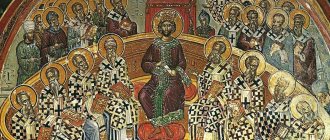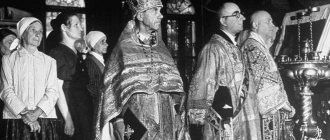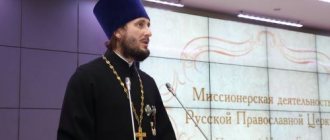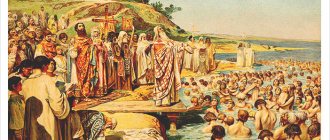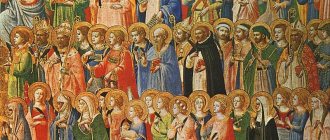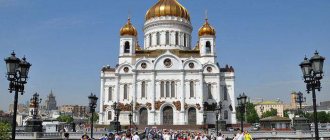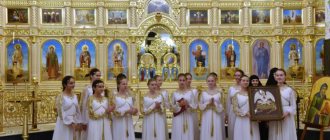Holy Venerable Abraham of Smolensk
Photo gallery
On September 3, according to the new style (August 21, according to the old style), the Russian Orthodox Church celebrates the memory of the holy Venerable Abraham of Smolensk. This holiday is especially close to us, Smolensk residents, since the Monk Abraham is one of the most revered saints of the Smolensk region. His example inspired and continues to inspire many Orthodox Christians on their life path.
The 12th century was the heyday of secular and spiritual life in the Smolensk principality. Smolensk was one of the political and cultural centers of Rus', churches and monasteries were erected everywhere, and the Smolensk princes in every possible way contributed to the spread of Orthodoxy throughout the principality. At this time, Abraham’s parents, Simeon and Mary, lived, strictly adhering to Christian teachings. Having twelve daughters, they earnestly prayed to God for the gift of a son, and their prayer was heard. The saint, who bore the name Athanasius before his tonsure, was born between 1150 and 1172 and from childhood was distinguished by special piety. Despite the desire of his parents to marry him, after their death Afanasy distributed his property to the poor, taking upon himself the feat of foolishness. He walked around the city in thin clothes, like a holy fool, praying to God to show Athanasius the right path.
Soon he took monastic vows at the Selishchensky Monastery under the name Abraham. The monk had a special craving for church books and, not content with the monastery library, collected sacred literature throughout the principality, copying out separately the best passages and thoughts. Many laymen came to him from the city for the sake of “consolation from the holy books.” Abraham soon became widely known in the Smolensk region.
At the end of the 12th century, Abraham accepted the rank of hieromonk. The saint performed the Liturgy daily with humility and fear of God. At this time, the abbot of the monastery, who had previously patronized Abraham, became filled with envy towards him and began to revile and persecute him in every possible way. The monk spoke about this time: “for five years we endured temptation, we were reviled and dishonored, like a villain.” But Abraham endured all the attacks steadfastly and with humility.
Soon the monk moved to another monastery, the Venerable Cross, expanding and decorating it. People flocked in thousands to listen to the saint's sermons and instructions. Seeing this, Abraham's enemies from the church stirred up the people against him, raising accusations of heresy and even sorcery. Soon a crowd of people burst into the monastery and, seizing Abraham, dragged him to the princely court. The saint's enemies tried in every possible way to accuse him, but the prince did not find any guilt on Abraham's part and ordered him to be released. The next day, the monk appeared before the church court, at which Bishop Ignatius, seeing the hatred of Abraham’s enemies towards him, made a concession and ordered him to be removed to the Selishchensky monastery and banned from serving.
But soon the wrath of God struck the entire city. A terrible drought began in the Smolensk region, against which even popular prayer was powerless. Remembering the slandered monk, the bishop asked him for forgiveness and through Abraham’s prayers it began to rain.
After his acquittal, the saint was installed as abbot of the Episcopal Theotokos Monastery. Having improved this monastery, the Monk Abraham ended his worldly life there, departing to the Lord around 1219 and was canonized in 1549. His holy relics were hidden in 1611 during the Polish invasion, and after that they were never found.
The life of St. Abraham of Smolensk is an example of an Orthodox preacher. Being a highly educated person and a talented speaker, the saint devoted all his abilities to the service of the Church, instructing and admonishing others, being a living example for his contemporaries. Like the biblical Job, the Monk Abraham innocently suffered at the hands of his enemies, but, like Job, God exalted Abraham for his patience with sorrows even more than before.
On this day, the patronal feast is celebrated in the Cathedral of the Spaso-Preobrazhensky Avraamiev Monastery; one of its three thrones is consecrated in honor of Abraham of Smolensk. On the same day, festive celebrations will take place in the Church of St. Abraham of Smolensk in the village of Golynki.
trounin.ru
A pious husband and wife wanted a son. Twelve daughters were born, but there was no son. And a son was born, to their joy. And as he grew up, he began to beg, behave like a holy fool, moved five miles away from Smolensk and became a monk. From that time on, he read and copied the books of God, fasted as an example to his brethren, rejoicing in bodily torments. Abraham also fought with the devil's obsessions, driving out the heart-worm.
From memory, Abraham read the books of God to people. People understood him and were grateful. The forces of hell did not sleep, penetrating the souls of the weak with faith. Blasphemy was raised against the blessed one, apparently out of envy. Abraham accepted it properly—a test sent to him from above. Joy possessed him, having the opportunity to suffer as Christ suffered, blasphemed by envious people. The more they stipulated, the more he rejoiced.
Abraham was not afraid of the torment given, having defeated Satan at night, he was a winner in the morning. Yes, there was no reasonable person in Smolensk; everyone mocked the holy fool. Ephraim alone, who saw him and later wrote a Life about him, took Abraham for a lamp, breaking the way to the hearts of people through darkness. Ephraim's soul opened, just as windows open at the hour of enlightenment. Ephraim accepted the efforts of the blessed one, indulging them.
What was bad led to good. They forced Abraham to remain silent, he fell silent, because it was a test. They told me to paint an icon, but he wrote it because it was a test. They were going to excommunicate him from the faith, he rejoiced, because this was also a test. Abraham endured everything, wanting difficulties in life.
And for us, the descendants of Abraham from the city of Smolensk, a lesson is how to think. Do not seek salvation in the world, do not have peace of mind in everyday life and do not shift the concern for your destiny onto the shoulders of others. A person is supposed to suffer, because he lives for the testing of body and spirit, and not for other things that he supposedly needs. But you should not take the image of Abraham literally; you must understand that he was a holy fool. And he sought salvation in extremes. There is no need to harm yourself, as Abraham did, you just need to accept what is due under the guise of a test that must be endured.
It’s bad for everyone, and everyone thinks about it, and everyone wants good, not understanding that good is based on someone else’s grief. So isn’t it better to accept someone else’s grief yourself, allowing someone else to have the good? Otherwise it won't work. When you look for good, you do bad, and when you try to get used to bad, you create good. Not for yourself, but others take advantage of it. And because of their good life, they blaspheme and lie against you. So why be among them, if not to bring blasphemy and false accusations against the suffering? Then others will cry out, striving for good, wishing to throw off the blasphemy from themselves, raising lies in vain in response. And then there will be no salvation, and there will be those who suffer, and there will be a Day of Judgment, and everyone will be rewarded, for everyone will be guilty of sins, and then no one will find paradise after death.
Author: Konstantin Trunin
Additional tags: life of Abraham of Smolensk critic, analysis, reviews, review, book, Abraham of Smolensk, analysis, review, book, content
This may also interest you: - List of critical notes on the literature of Ancient Rus'
Source
Monastic exploits
With great humility and meekness, young Abraham performed all the feats of obedience: he spent a lot of time in prayer and fasting, studied the Holy Scriptures, the lives of saints, and patristic literature. Diligent study brought useful results. Avraami was diligently busy rewriting books. By order of the Smolensk prince Roman Rostislavich, a school appeared in the city, which taught not only Slavic, but also Greek and Latin books. Prince Roman himself had a large collection of books that Abraham used.
Abraham labored in the monastery for more than 30 years. In 1198 he took priestly orders. Abraham did not leave a single day without the Divine Liturgy and sermon. His instructions attracted many to the church. Those languishing with spiritual thirst came to him to heal their spiritual ulcers. Despite the presence of rank, Abraham did not abandon his usual monastic feat, as a lover of poverty and humility.
Repose of Abraham
Bishop Ignatius reposed at a ripe old age. More than before, Abraham inspired the brethren to remember death and to pray day and night so as not to be condemned at the righteous judgment of God. Archimandrite Abraham reposed before 1224, having lived in monasticism for 50 years.
In 1238, Ephraim, the beloved disciple and zealous imitator of the virtues of Abraham, died. Already at the end of the 13th century, a service was compiled for the Monk Abraham, jointly with his disciple the Monk Ephraim.
Troparion, tone 8.
Today your memory is more glorious for us, like the sun shining, illuminating the whole world with its rays, and driving away the darkness of the night of evil spirits from us. Today the heavenly powers and the holy angels and the souls of the righteous mentally triumph and rejoice. Today we too, sinners, pray to Father Reverend Abramius, pray to Christ God unceasingly to save the city and the people who worship you.
Kontakion, tone 3.
Lord shine upon Thy city, the memory of Thy saint is like a bright sun, joyfully illuminating everyone with rays. Moreover, the prayers of the Most Pure Ti Matera deliver us from all troubles and exercise our barbaric vacillation. In this way we are Thy people, and we boast of our great city, and we are saved by the prayers of Thy saint, Abramius the Reverend Father.
Persecution of the ascetic
As you know, the enemy of the human race never sleeps, using every moment to incite sedition. Abraham had to endure a lot of persecution from people who were jealous of his preaching abilities. The abbot of the monastery himself turned out to be influenced by the dissatisfied and rebelled against Abraham, forbidding him to preach. After 5 years, Abraham was forced to go to the Holy Cross Monastery, located in Smolensk itself. Gradually, people began to flock here to listen to the instructions of the priest. People were also attracted by the ascetic, ascetic life of Abraham.
Abraham painted two icons for the temple: “The Last Judgment of the Second Coming” and “Image of the ordeals carried out by the soul after death.” Abraham taxed his flesh with strict fasting. As his life tells, his face was pale and unusually dry. In sacred robes he looked like St. Basil the Great, whose life he imitated.
Saint Basil the Great with his life. Icon, early 17th century. From the Church of the Intercession of the Solvychegodsky Holy Cross Monastery. Solvychegodsk Historical and Art Museum
Abraham was strict both to himself and to his spiritual children. He talked tirelessly with both rich and poor. During the Divine service, he strictly observed that none of the brethren and people allowed themselves to talk in the temple, because he considered this to be sacrilege. He performed the Divine service with special reverence.
It is known that Abraham not only read spiritual literature, but also wrote teachings himself. But time turned out to be merciless to the works of the ascetic, only one recording of his sermon remained: “The Word about the heavenly powers, for the sake of which man was created,” found in the 19th century in the library of the Joseph-Volotsky Monastery. Abraham, discussing the purpose of man, says that he “was not created in order to eat, drink and dress in beautiful clothes, but in order to please God.”
Enlighten the icon of St. Abraham of Smolensk
Abraham experienced many devilish temptations during his feat; the human enemy appeared to him in terrible images, thinking to frighten the ascetic, but he was always defeated by prayer. Envy on the part of those around him gave rise to slander against the holy monk Abraham, as if he were preaching heresy and doing evil. These rumors confused everyone and soon reached Bishop Ignatius. The city authorities and the clergy demanded that the bishop bring the priest to trial. The biographer of Abraham, his student Ephraim, repeatedly emphasizes that Abraham became a victim of the Smolensk clergy. His learning and kindness are contrasted with “the ignorant who take the priesthood.” At the trial, “God soften the heart of the prince and rulers, and devour him alive, even if powerfully, for the abbot and priest.” At the trial, Abraham repelled all unjust accusations, but despite this, he was forbidden to perform sacred functions and was sent to the former monastery of the Mother of God.
Miraculous deliverance from drought through the prayers of the holy monk Abraham
After the conviction of Abraham, troubles began in Smolensk: drought and disease. And nothing helped. Then the local priest Lazar came to Bishop Ignatius with a demand to allow Abraham to perform divine services, otherwise even greater troubles await the residents of Smolensk. The bishop allowed Abraham to perform sacred functions, asked him for forgiveness for his unjust condemnation, and prayers for the city and its inhabitants. The humble priest himself asked the bishop to pray.
Returning to his cell, Abraham indulged in fervent prayer, and suddenly it began to rain heavily and the drought ended. Then everyone became convinced of his righteousness and began to highly respect him.
